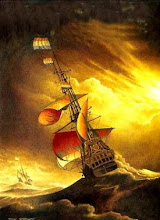 Excellent historical fiction.
Excellent historical fiction. A remarkable story of heroism and adventure, of a boy who had to become a man too soon, of a family and a tribe who had to learn to win to survive. A man without a tribe was at great risk, so the young boy abandoned with his siblings on the harsh Mongolian plains had to struggle to avoid death. He survived both starvation and hostile attacks by learning remarkable leadership skills and gathering a group of outsiders like himself. Hunted and alone, he dreamed of uniting the tribes into one house, one nation. He became a great warrior. He would become father to his people. He would be Genghis Khan.
I read this book a while ago and didn’t get to writing a review yet. But a review is in order, because this book deserves the highest recommendation imho. For me there’s just a fine line between an enjoyable historical novel or a good fantasy book – I like my fantasy light, with low key magic. I enjoy good stories however that focus on massive battles, political machinations and adventure in various interesting settings. The real world can be as good a stage for me as a well developed fantasy world. Because the (13th century) Mongolian plains that make up most of the stage of this book was almost like a ‘new’ world to me it is easy to recommend this book also to readers who tend to stick exclusively to (epic) fantasy.
I read this book a while ago and didn’t get to writing a review yet. But a review is in order, because this book deserves the highest recommendation imho. For me there’s just a fine line between an enjoyable historical novel or a good fantasy book – I like my fantasy light, with low key magic. I enjoy good stories however that focus on massive battles, political machinations and adventure in various interesting settings. The real world can be as good a stage for me as a well developed fantasy world. Because the (13th century) Mongolian plains that make up most of the stage of this book was almost like a ‘new’ world to me it is easy to recommend this book also to readers who tend to stick exclusively to (epic) fantasy.
Wolf of the Plains is the story of Temujin, who would be later known to his people and the world as Genghis Khan. Temujin was born a son of the khan of his tribe, the Wolves. Although there’s little written account of the life of Genghis Khan, there are some facts known of his early life. It is known that when his father died Temujin, his mother and siblings, were cast out of the tribe and left to die on the frigid Mongolian plains. Temujin’s older brother was too young to take on his father’s position and they were abandoned. Circumstances made Temujin leading figure in the survival of his family and his slow and difficult rise to a position of power.
Historical purists or fanatics always have criticism on historical fiction because authors take creative liberties. I am not a purist nor fanatic but I simply enjoy an engrossing story with characters you care about. Iggulden carefully explains in his afterword where he took some artistic liberties and what is based on actual fact. Even so: it’s not called historical fiction for nothing. So don’t expect a history book but a straight up action packed and fast paced read that’s hard to put down.
Another reason that makes this book a high quality read is Iggulden's description of the life as lived by 13th Century Mongol tribesmen. He clearly thoroughly researched the era and the people (as he explains in his notes). Their way of life really comes alive and is completely believable: The strong tribal structure, the nomadic lifestyle of the Mongols, the prowess with bow and arrow, the importance of horses and good horsemanship; what they ate; the drinking of the blood of their living horses when there was no food available; the constant warfare and uneasy, shifting alliances between the tribes, and the warfare and tensions between the Mongols and other races in the area such as the Tartars in the north and the Chin in the south.
This book covers Temujin’s youth. So keep in mind that this is the first book in a three book series! We get to know Temujin through his hardships in his early years and we see him develop in a hard, brutal, ambitious, vengeful and intelligent leader of men. Funny thing is that we get to see the development of his empire through the Mongol eyes. History tells us Westerners that the Mongols were a ruthless an barbaric kind of people who paved their empire by ways of death and destruction. And although Iggulden does not try to sweeten the picture of the exploits of Genghis and his peers and ruthlessness was definitely part of their tactics, the fact that we see it ‘from their side’ does make you think. We are more inclined to think of Alexander the Great or Julius Ceaser or Richard Lionheart as great conquering heroes. But people like Atilla the Hun and Genghis Khan are barbaric tribesmen in our collective history’s eyes. Depends on which continent you grew up I guess…
But I digress… Wolf of the Plains (Birth of an Empire in the US) is a terrific start to a three book series. And although the pace of this first installment may be a little bit slower than that of two following books it’s a truly wonderful book. Don’t let the slow start put you off, but enjoy the atmosphere / ‘worldbuilding’ and the introduction of the characters. Soon enough you’ll be engrossed in the life and trials of Temujin and hungry for the next installment!
9 / 10






No comments:
Post a Comment